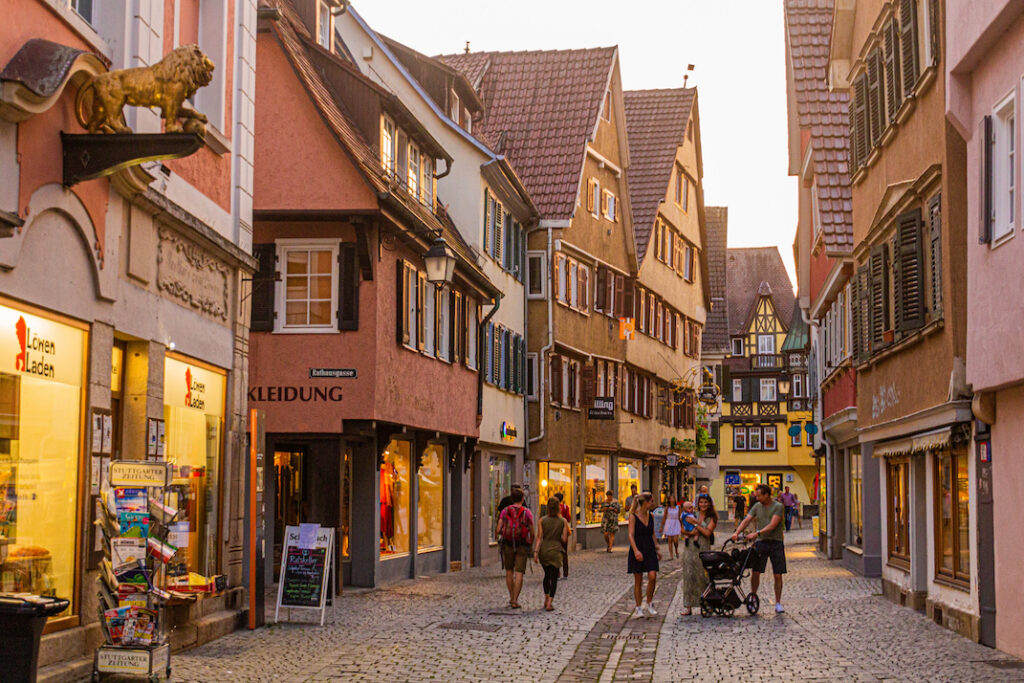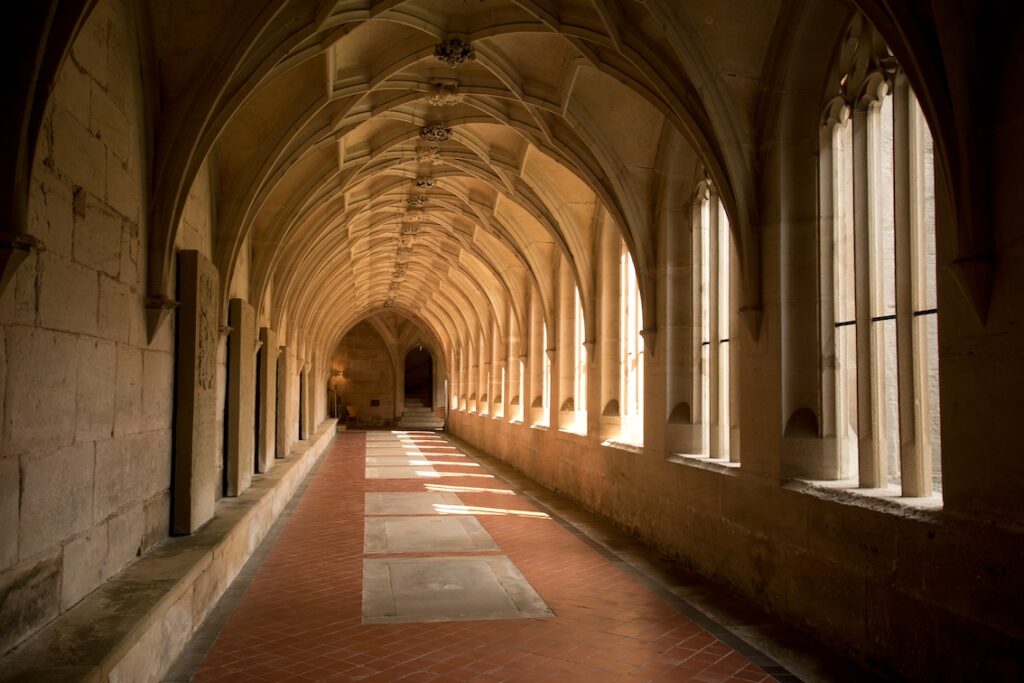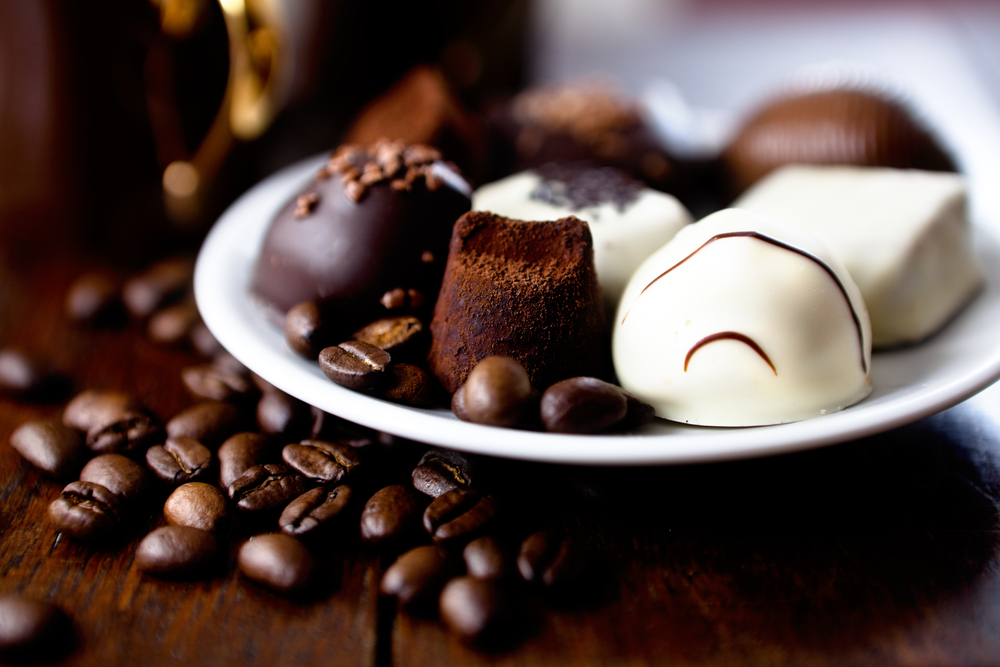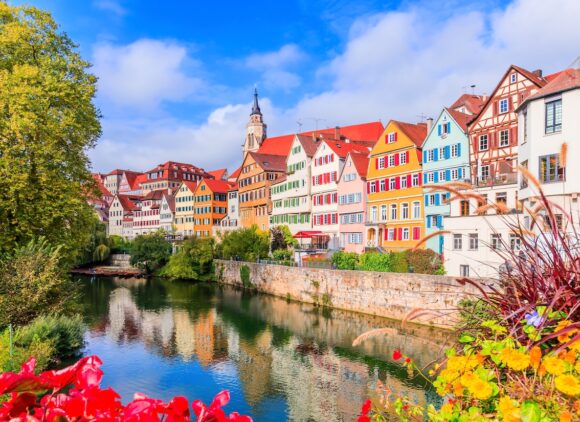Located between the Neckar River and the Swabian Jura forests just outside of Stuttgart, the beautiful university town of Tübingen dates back to the Middle Ages and offers castles, cobblestone streets, streets running along canals, small steps, narrow alleys and half-timbered houses. This historic, picturesque, and surprisingly hip town definitely merits a visit.
Tübingen Essentials
Tübingen has more than 90,000 residents with a mixture of students (representing a third of the population), researchers and academics, medicals specialist and Gorgens (the people whose families have roots to the city from the beginning). The young and cosmopolitan part of town also has swanky restaurants, trendy stores, boat trips on the Neckar and a sophisticated night life with street cafes, wine taverns, student pubs, street festivals and much more.
The city of Tübingen also offers various tours and events in more than 10 languages such as wine tasting; Swäbisch costumes guides; Bretzel (pretzel) classes; eerie or scary city tours; Jewish life in the city; Night at the Botanical Garden of the University; Night at the Museum; Knights, Peasants & Dukes children guides, and more. Well respected cultural events in the city include art exhibitions, festivals, concerts, stage plays as well as readings with poets of international reputation. Weekly and seasonal events are also held regularly in the center of Tubingen including an outdoor theater and Europe’s largest Afro –Brazilian festival.
If you’re looking for a place to start, though, here are four great things to check out in Tübingen.
Altstadt (Old Town)
Tübingen dates back to 1078 A.D. and is quite a unique treasure, especially because it has such a well-preserved Altstadt. Tübingen’s old town, which lies along the Neckar River, is one of only a few completely intact old towns in Germany. Because of its lack of heavy industry, only one bomb fell during World War II. Therefore, the Altstadt looks very much just as it did back in the 1600s.
 Matyas Rehak / Shutterstock.com
Matyas Rehak / Shutterstock.com In the old town you can visit the castle, Schloß Hohentübingen, which is now part of the University of Tübingen. All cultural and science-oriented faculties of the university as well as their instructive collections moved to the castle after many years of renovations, and a museum opened to the public in 1997. It exhibits collections dating back to the 18th century including permanent exhibitions such as the collections of pre and early history, classical archeology, Egyptology, ancient Orientalism, numismatics, ethnology as well as the Replica Collection (replicas of famous Greek and Roman sculptures).
Visitors can wander through preserved rooms of the 1537 tripartite oriel in the knights’ hall and the 1507 rotunda in the tower, as well as learn more about the history of the castle, city and country. Coins and medals from its state of Baden Württemberg are also on display. Additionally, children and teenagers can participate in workshops on the stone ages, hieroglyphs and antique costumes.
Hölderlinturm (Hölderlin Tower) Museum
One of the best known and most frequently photographed sights is the Hölderlin Tower Museum, a 13th century building that served as the home of the late 19th century German poet Friedrich Hölderlin. Becoming well known after his death, Hölderlin’s work is considered to be some of the best writing in the German language.
The city acquired the house in 1921 and in 1984 renovated the interior to match the layout of Hölderlin’s time. The museum houses permanent and temporary exhibitions as well a reference library. Additionally, the views of the Neckar River are spectacular.
Cistercian Monastery of Bebenhausen
In beautiful North Tübingen, you will find the almost perfectly preserved Cistercian Monastery of Bebenhausen, with its medieval enclosure. The monastery was founded between 1180 and 1183 by Rudolf, Count Palatine of Tübingen.
 Odessa25 / Shutterstock.com
Odessa25 / Shutterstock.com The abbey was taken over a few years later by Cistercian monks and soon developed into one of the wealthiest monasteries in the land. The monastery was disbanded in 1535 and later served as a Protestant monastic school.
Additionally, the buildings adjacent to the monastery were turned into a hunting palace by the kings of Württemberg in the 19th century. Tours include seeing the rooms of the medieval monastery as well as the hunting castle which is complete with a 1915-1916 castle kitchen.
ChocolART Chocolate Festival
Each December, on the weekend before Tübingen’s famed Christmas Market, chocolate lovers can enjoy ChocolART, one of the world’s most prestigious chocolate festivals (taking place this year from Dec. 3-8, 2024). More than a hundred top international chocolatiers hailing from Africa, South America, North America and Europe will present, sell and compete to achieve the best cocoa-based products.
 Barbara Dudzinska / shutterstock.com
Barbara Dudzinska / shutterstock.com Getting to Tübingen
By car, Tübingen three hours southeast of Kaiserslautern, less than one hour south of Stuttgart, and two and half hours south of Wiesbaden via A8. Go to DB Bahn for train information.
Bookmark This Page Today for Exclusive Deals
Booking.com








